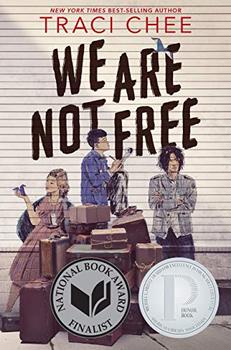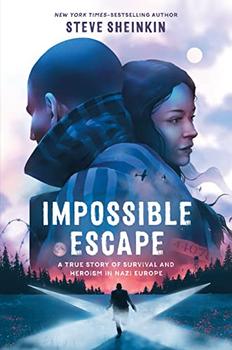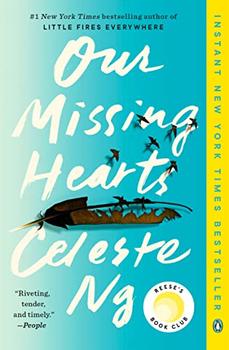Summary | Excerpt | Reading Guide | Reviews | Beyond the book | Read-Alikes | Genres & Themes | Author Bio

"All around me, my friends are talking, joking, laughing. Outside is the camp, the barbed wire, the guard towers, the city, the country that hates us.
We are not free.
But we are not alone."
From New York Times best-selling and acclaimed author Traci Chee comes We Are Not Free, the collective account of a tight-knit group of young Nisei, second-generation Japanese American citizens, whose lives are irrevocably changed by the mass U.S. incarcerations of World War II.
Fourteen teens who have grown up together in Japantown, San Francisco.
Fourteen teens who form a community and a family, as interconnected as they are conflicted.
Fourteen teens whose lives are turned upside down when over 100,000 people of Japanese ancestry are removed from their homes and forced into desolate incarceration camps.
In a world that seems determined to hate them, these young Nisei must rally together as racism and injustice threaten to pull them apart.
I
We Never Look Like Us
Minnow, 14 March 1942
It's been over three months since the attack on Pearl Harbor, and my oldest brother, Mas, has told me to come straight home from school each day. Take the bus, he says. No loitering around, he says. I mean it, Minnow.
I used to love walking back to the apartment in the afternoons, seeing all the interesting things going on in the city: bodies being excavated at Calvary Cemetery, buildings going up in empty lots, chattering kids coming out of Kinmon Gakuen, the old Japanese language school.
But that's been closed since last December, when it became the Civil Control Station, because Pearl Harbor changed everything for us. We have a new eight-p.m. curfew. People are starting to talk about involuntary evacuation. And Mas has warned me not to get caught out alone. Don't do anything that'll make them come down on you, he says. Don't give them any excuse.
And I haven't.
Until today.
I don't know what happened. I was walking out of George ...
In this novel, which begins in 1942, 14 Japanese American teenagers are ripped from their lives in San Francisco and relocated to detention camps scattered across the western United States. Chee draws on the experiences of her own grandparents to recreate events and bring to vivid life characters with a wide range of personalities and versions of the broken American dream. With a more individual focus, Traci Chee offers a wider, multifaceted picture of this shameful episode in America's past...continued
Full Review
(753 words)
This review is available to non-members for a limited time. For full access,
become a member today.
(Reviewed by Catherine M Andronik).
 Akemi Dawn Bowman, Morris Award Finalist and author of Starfish
Traci Chee masterfully weaves together harrowing truths about the mass incarceration of Japanese and Japanese-Americans during WWII, and features a cast of friends whose honesty, strength, and love for one another will break your heart. With characters who need to have their stories told, and a history that should never be forgotten, We Are Not Free is powerful, moving, and so incredibly necessary.
Akemi Dawn Bowman, Morris Award Finalist and author of Starfish
Traci Chee masterfully weaves together harrowing truths about the mass incarceration of Japanese and Japanese-Americans during WWII, and features a cast of friends whose honesty, strength, and love for one another will break your heart. With characters who need to have their stories told, and a history that should never be forgotten, We Are Not Free is powerful, moving, and so incredibly necessary. Debbi Michiko Florence
These powerful interconnected stories of incarceration during WWII told by Nisei youth will wrap around your heart like barbed wire. With deft touches of humor, heart, pathos, and anger, We Are Not Free by the talented Traci Chee is the best Japanese American incarceration novel I've read. I loved this book that epitomized gaman and will be buying a copy for everyone in my family.
Debbi Michiko Florence
These powerful interconnected stories of incarceration during WWII told by Nisei youth will wrap around your heart like barbed wire. With deft touches of humor, heart, pathos, and anger, We Are Not Free by the talented Traci Chee is the best Japanese American incarceration novel I've read. I loved this book that epitomized gaman and will be buying a copy for everyone in my family. Veera Hiranandani, Newbery Honor winning author of The Night Diary
A brilliant and intimate portrayal of several San Francisco teenagers during the mass incarceration of Japanese-Americans in World War II. Chee's nuanced and unforgettable characters will serve to enlighten readers about this devastating and shameful piece of America's past. A beautiful, painful, and necessary work of historical fiction.
Veera Hiranandani, Newbery Honor winning author of The Night Diary
A brilliant and intimate portrayal of several San Francisco teenagers during the mass incarceration of Japanese-Americans in World War II. Chee's nuanced and unforgettable characters will serve to enlighten readers about this devastating and shameful piece of America's past. A beautiful, painful, and necessary work of historical fiction. In Traci Chee's young adult historical novel We Are Not Free, which follows 14 Japanese American teens from San Francisco through World War II, two young men in Topaz detention camp, Mas and Twitchy, decide to volunteer for the army. Japanese American men were unable to serve until early 1943; the American government had considered them enemy aliens since the bombing of Pearl Harbor. Director of the Office of War Information Elmer Davis urged President Franklin D. Roosevelt to reverse the ban on soldiers of Japanese descent in a 1942 letter, in part for propaganda reasons, but also because he believed most Japanese Americans were loyal citizens and deserved to serve if they wished.
In Traci Chee's young adult historical novel We Are Not Free, which follows 14 Japanese American teens from San Francisco through World War II, two young men in Topaz detention camp, Mas and Twitchy, decide to volunteer for the army. Japanese American men were unable to serve until early 1943; the American government had considered them enemy aliens since the bombing of Pearl Harbor. Director of the Office of War Information Elmer Davis urged President Franklin D. Roosevelt to reverse the ban on soldiers of Japanese descent in a 1942 letter, in part for propaganda reasons, but also because he believed most Japanese Americans were loyal citizens and deserved to serve if they wished.
But once they enlisted, Japanese American soldiers were ...
This "beyond the book" feature is available to non-members for a limited time. Join today for full access.

If you liked We Are Not Free, try these:

by Steve Sheinkin
Published 2023
From three-time National Book Award finalist and Newbery Honor author Steve Sheinkin, a true story of two Jewish teenagers racing against time during the Holocaust - one in hiding in Hungary, and the other in Auschwitz, plotting escape.

by Celeste Ng
Published 2023
From the #1 bestselling author of Little Fires Everywhere, comes one of the most highly anticipated books of the year – the inspiring new novel about a mother's unbreakable love in a world consumed by fear.




Dictators ride to and fro on tigers from which they dare not dismount. And the tigers are getting hungry.
Click Here to find out who said this, as well as discovering other famous literary quotes!